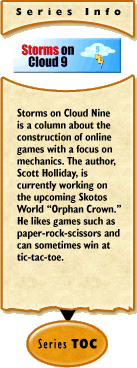 Storms on Cloud Nine #3: Storms on Cloud Nine #3:
Alternate Winning Conditions
by Scott Holliday
February 7, 2003
About two months ago, I was showing off Castle Marrach to one of my friends. Immediately, she wanted to generate a character. My first thought? "Nifty! First-hand market research!" I watched closely as she started picking attributes. Milk-white skin, apple cheeks. She was smiling avidly, clearly having fun in the process. Almond shaped honey-brown eyes. This was great! I'm thinking to myself, "perhaps female gamers enjoy choosing their character's visual traits?" Butchered, ginger hair in a bun. She was grinning widely when she finished and turned to me, "Do you get it?" I looked more closely at her character. She was imitating someone? The name didn't ring any bells. The description didn't seem to fit any characters I knew. I guessed a few, but eventually I had to give up. She smiled at me and laughed, "Don't you see? She's made out of food!"
Games, even in the most isolated or primitive societies, almost invariably focus on the competition between two or more people. The rise of the computer game allowed a third party, the computer opponent, to enter the field. At the same time, games in which you played against yourself to get a higher score became more common. Despite these changes, in almost every case, the games were still competitive since players could then compare their scores, times, or ending states.
Then came the online game, and then the online RPG. Initially, programmers and developers kept on using the old tried and true. Character level, ability, and sometimes PVP power became the new standard. Looking at the current graphic MMORPG offering, I would hazard to say that it is still a successful strategy. However, as the media became more society driven, a new sub-society was born. Some players' only goal was to further the story. Some wanted to map every nook and cranny. Some wanted to figure out every secret and puzzle. Some simply wanted to play their characters — comedians and drunkards, poets and politicians.
I'm sure that many of you are familiar with Maslow's Hierarchy of Needs. I usually think of most psychologists as crack-pots, but often they get the gist of things. The idea is that humans have a set of progressively less essential needs. If you need water, you don't care about food, if you are starving, you don't care about shelter, and so on... up the pyramid. At the top is a category called, "Self-Actualization." This is the hard-to-define area of what you want when you are otherwise satisfied. I know a certain person who claims he achieves self-actualization when he causes people to laugh and spurt milk out of their nose.
My point here is that most of the audience for online games is aiming for that top category. You could argue that it might be one category down, "Self-Esteem", but certainly if they needed something essential, they wouldn't be sitting at a computer. As result, there is no way to know what the audience really wants. I listed a few alternate MMORPG goals above, but seriously, those are only the few that I can perceive. I'm sure in a hundred potential gamers, only a very few will be entertained by a competitive "must reach next level" mentality. Conversely, only a few more will enjoy the story, social, puzzle, explorer or PVP aspects. Which leaves the rest with goals that I'm not even aware of yet...
However, I would argue that this is the hidden blessing of online games. Each player is able to pursue their own goal. Clearly, if all the players are all pursuing the same goal, then they can't all "win." From my experience in PVP online RPGs, those who "win" keep playing and those who "lose" often get unhappy and leave. In fact, from watching both sides, my guess is that abusing the "losers" IS how some players reach self-actualization (or possibly self-esteem). Nothing is more telling than a "winner" getting angry when someone loses gracefully.
So, having said all of that, what is the conclusion? How do we design better online games? Personally, I think the answer is simple. Make sure the players have many different goals available, each one equally important and interesting. For instance, if a game is built around PVP, then that will be the only real goal. Crafting, exploring, and other such goals will all be tailored to the goal of "winning" the PVP war. I've got nothing against PVP. In fact, I usually prefer games in which PVP is encouraged. However, if that's the only real goal, it turns out to be a very shallow game with a very small audience.
In contrast, it seems like most graphic MMORPGs today have the same main goal — prowess at dispatching monsters. Almost all of their content is designed purely to that end. They are clearly successful, so at least some of the gaming populace must like that as a goal. However, imagine something better. Imagine a game where each pursuit is equally important and/or interesting. Imagine a game where crafting, exploring, and puzzle-solving has just as much importance and content, just as many obstacles to be overcome, and just as many cool effects and prizes. Imagine a game where adventurers only make up a small proportion of the population because there are too many other interesting things to spend your time on.
Yes, I'm talking about the dream game here. I can't do it. But, maybe I can at least do part. Take the first step maybe... and hope to point the way for the next.
|
Recent Discussions on Storms on Cloud 9:
|
|
|
  |
|

